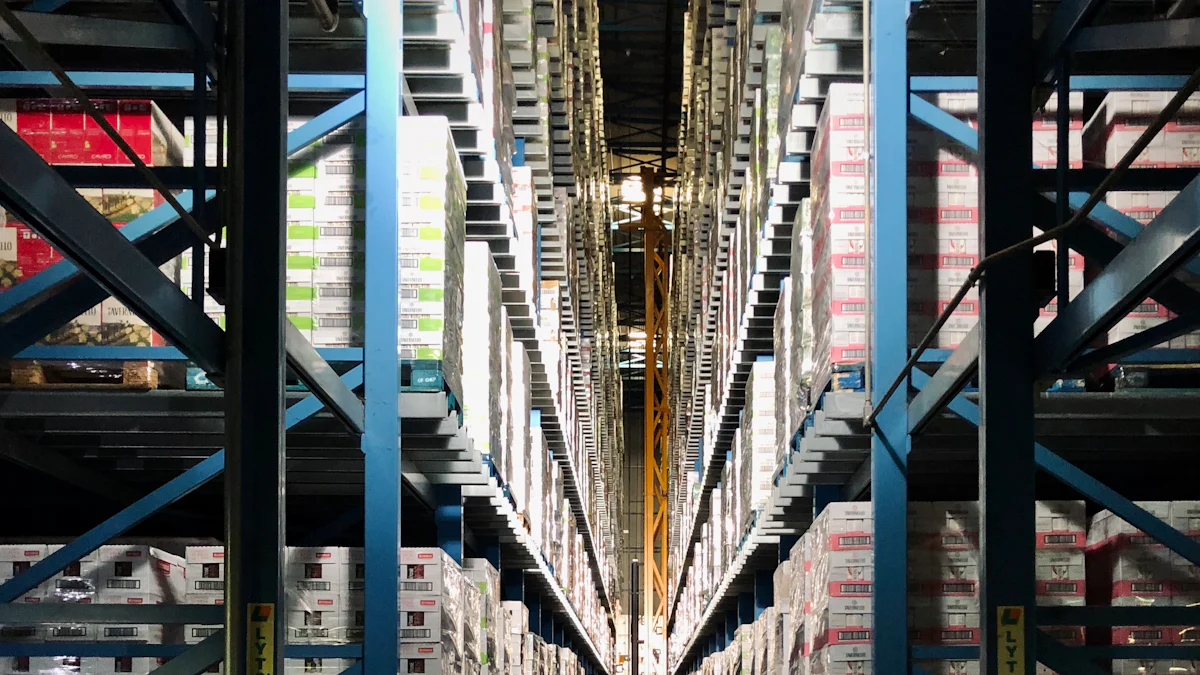Enhancing Supply Chain Efficiency in 2024 Through AI and Sustainability

In 2024, the supply chain efficiency in 2024 landscape is evolving rapidly, demanding a strategic blend of AI and sustainability practices. The integration of these cutting-edge technologies is paramount for organizations aiming to streamline operations and stay ahead in the competitive market. This blog delves into the pivotal role that AI and sustainability play in revolutionizing supply chains, offering insights into key strategies and trends driving efficiency enhancements.
AI in Supply Chains

Automation Opportunities
Identifying labor-intensive activities is a crucial step in optimizing supply chain operations. By pinpointing tasks that require significant human effort, organizations can effectively strategize the implementation of automation solutions. This proactive approach ensures that resources are allocated efficiently, leading to enhanced productivity and cost savings.
Implementing AI-driven automation revolutionizes traditional supply chain processes. Through the utilization of artificial intelligence technologies, repetitive and time-consuming tasks can be streamlined with precision and accuracy. This not only reduces human error but also accelerates operational timelines, enabling businesses to meet customer demands promptly.
Data Analysis
Utilizing vehicle telematics provides real-time insights into fleet performance and driver behavior. By harnessing this data, organizations can optimize routes, minimize fuel consumption, and enhance overall transportation efficiency. The integration of telematics systems with AI algorithms enables predictive maintenance scheduling, ensuring vehicles are always in optimal condition.
Leveraging IoT devices offers a comprehensive view of supply chain operations. These interconnected devices collect data on inventory levels, environmental conditions, and equipment status. By analyzing this information through AI-powered platforms, companies can proactively address issues, prevent disruptions, and maintain seamless workflow continuity.
Analyzing delivery data is essential for refining distribution strategies. By examining delivery times, order accuracy rates, and customer feedback, businesses can identify areas for improvement and implement corrective measures swiftly. AI algorithms can detect patterns within this data to enhance route planning, reduce delays, and elevate customer satisfaction levels.
Supporting decision-making processes with advanced analytics tools empowers supply chain professionals to make informed choices swiftly. By utilizing predictive analytics models based on historical data trends and market forecasts, organizations can anticipate demand fluctuations accurately. This proactive approach enables timely adjustments to inventory levels and production schedules to meet consumer needs effectively.
Enhancing operational efficiency through advanced analytics involves optimizing resource allocation and process flows. By analyzing key performance indicators (KPIs) such as lead times, cycle times, and inventory turnover rates using AI-driven algorithms, companies can identify bottlenecks and inefficiencies within their operations. This data-driven approach facilitates continuous improvement initiatives that drive overall supply chain efficiency.
Sustainability in Supply Chains

Sustainable Practices
Artificial intelligence plays a crucial role in supply chains, leveraging its high data processing capabilities, analytics, and automation tools to enhance the efficiency and sustainability of existing systems. Embracing sustainable practices through AI not only benefits the planet but also enhances brand reputation, fosters innovation, and ensures long-term business success. Increasing pressures from investors and customers, coupled with a surge in climate change regulations, are forcing supply chains to transition to sustainable practices and curb their carbon footprint. Sustainability is now a key focus in supply chain management, underscored by vital Key Performance Indicators (KPIs).
Reducing carbon footprint
To reduce the carbon footprint effectively, organizations need to implement eco-friendly initiatives across their supply chain processes. This involves optimizing transportation routes to minimize emissions, adopting energy-efficient practices in warehouses and distribution centers, and sourcing materials from sustainable suppliers. By integrating AI-driven solutions into these sustainability efforts, companies can analyze data patterns to identify areas where carbon emissions can be reduced significantly.
Implementing green logistics
Implementing green logistics strategies is essential for aligning supply chain operations with environmental goals. This includes transitioning to electric or hybrid vehicles for transportation, investing in renewable energy sources for warehouse operations, and promoting recycling programs within the organization. By leveraging AI technologies to optimize logistical processes such as route planning and inventory management, companies can streamline operations while reducing their ecological impact.
Customer Satisfaction
Decision-makers must comprehend how their supply chain functions, pinpoint suppliers and logistics partners contributing to eco-friendly practices, and identify impactful changes for the entire business. Specific supply chain sustainability areas where U.S. respondents are allocating funds include improving transportation efficiency, reducing waste and excess, and improving supplier sustainability and reporting.
Meeting eco-friendly demands
Meeting the growing demand for eco-friendly products requires supply chains to prioritize sustainable sourcing practices. By collaborating with environmentally conscious suppliers and implementing transparency measures throughout the production process, companies can meet consumer expectations for greener alternatives. AI-enabled solutions can track product origins, assess environmental impacts, and communicate these details effectively to consumers seeking eco-conscious options.
Improving brand reputation
Enhancing brand reputation through sustainable practices involves showcasing a commitment to environmental responsibility at every stage of the supply chain. This includes promoting ethical labor standards, reducing waste generation through efficient packaging solutions, and engaging in community initiatives that support environmental causes. By integrating AI technologies into brand sustainability efforts, organizations can monitor compliance with ethical guidelines, track progress towards sustainability goals, and communicate achievements transparently.
Regulatory Compliance
Adhering to environmental regulations is non-negotiable for modern supply chains aiming for long-term viability in a changing regulatory landscape. Organizations must stay informed about evolving legislation related to environmental protection standards...
Integration of AI and Sustainability
Synergistic Benefits
Enhancing efficiency through AI and sustainability
AI technologies like machine learning, predictive analytics, and automation play a crucial role in enhancing sustainability efforts within supply chains. By leveraging these advanced tools, organizations can streamline processes, reduce waste, and optimize resource allocation to minimize environmental impact. The synergy between AI and sustainability fosters a culture of continuous improvement, driving operational efficiencies while promoting eco-friendly practices.
Implementing AI-driven solutions enables real-time monitoring of energy consumption, emissions levels, and waste generation throughout the supply chain network. By analyzing data patterns generated by AI algorithms, companies can identify opportunities for enhancing energy efficiency, reducing carbon footprint, and implementing sustainable practices at every stage of the production cycle. This proactive approach not only benefits the environment but also contributes to cost savings and long-term viability.
Sustainable sourcing is a key focus area where AI technologies offer significant advantages. By utilizing machine learning algorithms to assess supplier performance based on environmental criteria, organizations can make informed decisions that align with their sustainability goals. This data-driven approach ensures ethical sourcing practices, reduces supply chain risks, and enhances brand reputation by promoting transparency in the procurement process.
Balancing resilience with efficiency
Achieving a balance between resilience and efficiency is essential for supply chains operating in dynamic environments. AI technologies provide valuable insights into potential disruptions, enabling organizations to proactively mitigate risks and build robust contingency plans. By integrating sustainability principles into risk management strategies, companies can enhance their adaptive capacity while maintaining operational efficiency.
Sustainability initiatives such as renewable energy adoption and waste reduction contribute to building resilient supply chains that can withstand external shocks. The integration of AI-powered predictive analytics tools enhances risk assessment capabilities by identifying vulnerabilities in the supply chain network. This foresight allows organizations to implement preventive measures that safeguard operations against unforeseen events while optimizing resource utilization for maximum efficiency.
Embracing a holistic approach that combines AI-driven innovation with sustainable practices empowers supply chains to thrive in an ever-evolving landscape. The harmonious coexistence of technological advancements and environmental stewardship not only drives operational excellence but also cultivates a culture of responsibility towards future generations. By embracing synergistic benefits through the integration of AI and sustainability, organizations pave the way for sustainable growth and competitive advantage in 2024.
Future Developments
Predicting trends in supply chain technology
AI-Powered Supply Chain Networks: The adoption of artificial intelligence technologies is expected to revolutionize supply chain networks by optimizing processes, enhancing visibility, and improving decision-making capabilities.
Blockchain Integration: Blockchain technology will play a pivotal role in ensuring transparency, traceability, and security across supply chain operations.
New data reveals the escalating levels of supply chain funding in 2024, emphasizing the industry's rapid investment in AI and sustainability. Generative AI emerges as a pivotal tool, with 91% of global organizations recognizing its effectiveness in optimizing supply chain processes and decision-making. This trend underscores the critical role that innovative technologies play in reshaping supply chain dynamics. As companies continue to prioritize efficiency and sustainability, embracing AI-driven solutions will be paramount for staying competitive and driving operational excellence in the evolving landscape.
See Also
AI Supply Chain Innovations: Unlocking Efficiency
Insights on AI Integration: Future Supply Chain Unveiled
Revolutionizing Logistics: AI Supply Chain for Tomorrow
Sustainability Exploration: Supply Chain Management with Robotics Tech Trends
